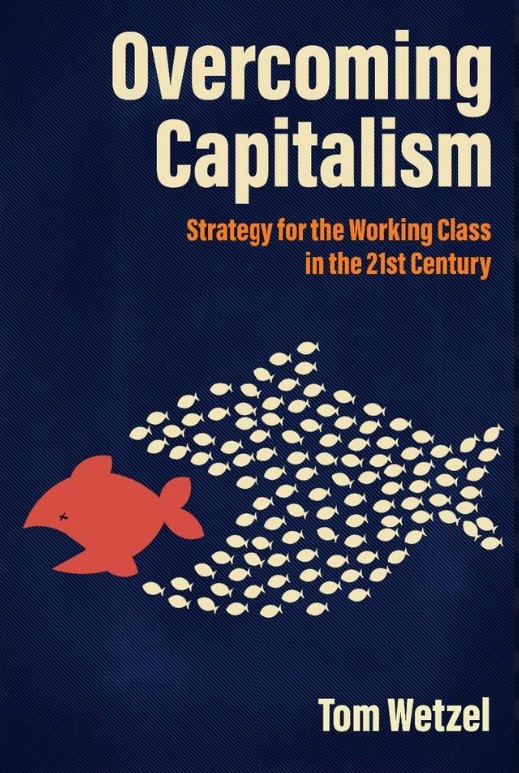Category: Uncategorized
The following is a review of Overcoming Capitalism at Anarchist Studies: Tom Wetzel, Overcoming Capitalism: Strategy for the Working Class in the 21st Century Chico: AK Press, 2022, 411 pp; ISBN 97818499354707 Anarchism, as is well known, emerged out of the international socialist movement of the nineteenth century. In both theory and practice, it is and always has been an anti-capitalist movement fundamentally characterized by its unwavering and unapologetic opposition to economic exploitation in all forms, and there is certainly no shortage of anarchist writings that enumerate and defend the under-lying reasons for this opposition. What is far less common, at least in the present, are clear and compelling discussions of what anarchist alternatives to capitalism might look like, let alone how to make such alternatives a reality. To the comparatively limited extent that such discussions exist at all, moreover, they tend to rely on ideas from earlier eras which, whatever their other merits, were developed in response to forms of capitalism that (by and large) no longer exist. There is, accordingly, a desperate need for fresh analyses of how anarchists should, or at least might, resist capitalist oppression in the twenty-first century, no less than what their ultimate end…
An important theory about the relationship between capitalism and technological development is “historical materialism” — Marx’s theory of history. Marx’s theory looks at the way society has been formed into “modes of production.” Modes of production are ways that a society is organized to make a living from nature. In Marx’s hypothesis, a “mode of production” has two parts. The “social relations of production” are the way the economy is structured through systems of class power. My description of the structural components of capitalism earlier in this chapter is a description of capitalism’s “social relations of production.” The second component of a mode of production is the “forces of production” that have been developed in that society. The forces of production include both the humans who work in production and their skills and know-how as well as the land, buildings and equipment they work with. In other words, everything included under “technology” as I defined it. Marx notes that various conflicts can occur between the “forces of production” and the “social relations of production.” For example, a major depression such as occurred in the 1930s can slow down or block technological development because capitalists stop investing in real improvements in…
This is a review of “Common Preservation” by Jeremy Brecher. This book is where Jeremy Brecher gives his theory or set of “tools” for explaining social movements. Jeremy is a significant influence at Labor Network for Sustainability and his “Green New Deal from Below” is an approach that is having some influence. So I wanted to understand his viewpoint. The book’s title comes from Gerard Winstanley of the “True Levellers” — sort of the radical wing of activists in the English revolution of the 1640s. Altho Jeremey doesn’t talk about origins of the True Levellers, they were part of the plebeian movement from below that arose in reaction to the vicious direction of the English ruling class in that era. This was the period when agrarian capitalism was created in England through a very vicious process. Large masses of rural people who had lived through subsistence agriculture, growing their own food, were kicked off the land by the barons. These “enclosures” were then ratified by the parliament. Thousands were tramping the roads. By the mid 1600s there were 600,000 propertyless wage-workers in England whereas this class had not existed a century earlier. The viciousness is indidcated by the Vagrancy Act…
Tom Wetzel gave this presentation on August 12th, 2023. A. Strategy To start off this discussion, I’m going to talk about strategy. In this case the subject is “grand strategy” — strategy that would enable the oppressed and exploited majority to liberate themselves, replacing capitalism with some form of self-managed eco-socialism. A strategy is a “line of march” or path, based on proposed actions and methods of organization. In developing a strategy we need to look at questions such as, Where are the key fault lines in society? Which sub-groups of the population are likely to go into motion, to be part of a period of growing resistance to the system? What forms of action and organization do we propose to base our strategy on? Since the 19th century the radical left has developed a menu of different strategies. In recent times there have been supporters of strategies such as building cooperatives (as with the Solidarity Economy Network people nowadays), electoral socialism or “socialism via the ballot box” (as favored by the majority in Democratic Socialists of America). And then there are the “Marxist-Leninist” groups with their strategy of building a activist or vanguard party to “manage” social movements with…
I’ll be giving a presentation and conducting a workshop on working class strategy, and discussing my book “Overcoming Capitalism,” at the 8th Los Angeles Anarchist Book Fair on August 12th. The workshop is scheduled to start at 1:55 PM. My plan is to talk a bit about strategy, syndicalism and how to decide about strategies and then have a discussion The book fair is going to be at Art Share, 801 East 4th Place (that’s just east of Alameda Street).
So, Black Flag in the UK has published a lengthy — and highly favorable — review of “Overcoming Capitalism,” written by Wayne Price.He has a few minor disagreements. He prefers to regard the former USSR as state capitalist rather than a bureaucratic centralist or managerial class despotism. I tend to disagree with this because I don’t think agencies competed in a market way internally in the system. This is using “competition” in a different meaning than when we describe the competitive dynamics of capitalism, which drives the search for profits. He also says USSR competed on the world stage — but I think this was the geopolitical competitions of states, as in the arms race. Again, this is a different meaning of the word “competition”. Wayne also thinks Marx did predict something like the modern bureaucratic control class (managers, high end professionals in capital’s apparatus of control) in Volume 3 of Capital. That may be, but I don’t think this has any effect, in that case, on Marxism as a political movement til after the emergence of the USSR. To find Wayne’s review, scroll down in the contents at: https://irp.cdn-website.com/3fa68967/files/uploaded/BlackFlag-vol3-no2.pdf
The state has two essential structural features. First, there is the iron fist of the state — it’s capacity for enforcing rules and systems that advantage the dominant economic class, the capitalists. This includes the police and courts and prisons and the military force that enables the state of the American capitalists to assert its power internationally, along with institutions like the IMF and World Bank and World Trade Organization, which derive from a US initiative at the end of World War 2. The second feature of the state is its ability to govern, to rule over the society and maintain the order it backs up. Governability can be undermined by mass insurgencies and protests, such as widespread strike movements. This leads the state to be a vehicle of concessions to the mass of middle class and working class people — even if these are opposed by actual members of the capitalist elite. Historically there are two tendencies that have worked to oppose this second face of the state — its concessions to mass protest, liberalism and fascism. Here I am referring to the original 19th century form of American liberalism. This arose in the 1870s as a tendency in…
By Tom Wetzel This is a reply to the review of Overcoming Capitalism by my friend Chris Carlsson in The Fabulist (https://fabulistmagazine.com/so-you-think-youre-an-anarchist-review/). Says Chris: “This is one of the more frustrating shortcomings of Wetzel’s book. He pays lip service in many places to the ecological crisis, but at no point does he discuss the overwhelming necessity of completely redesigning how we work, what we do, how we interact with nature, and how a radical reimagining of our material well-being is unavoidable. His argument about increasing efficiency allowing for damage-free “growth” is problematic, and I wondered if he’d heard of Jevons Paradox. This concept refers specifically to the idea that falling costs through increased (“throughput”) efficiency actually drives up aggregate demand for the product, ultimately leading to a greater ecological burden than before the new efficiencies were achieved. “First, of all I do actually talk about how work would be radically changed: “A twentieth-first century form of self-managed socialism would be a horizontally federated system of production that can implement planning and coordination throughout industries and over a wide region. This would enable workers to: This is in Chapter 5 on the ecological crisis, entitled “Cost-shifting”. I also discuss the capitalist degradation…

